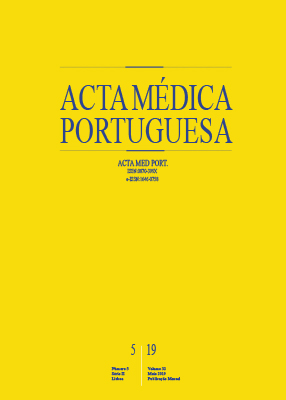Chronic Pain Education in Portugal: Perspectives from Medical Students and Interns
DOI:
https://doi.org/10.20344/amp.10773Keywords:
Analgesics, Opioid, Chronic Pain, Education, Medical, Internship and Residency, StudentsAbstract
Introduction: The International Association for the Study of Pain advocates a mandatory curriculum on chronic pain in medical schools. The objective of this study was to assess the opinions of final year medical students and interns about chronic pain education in eight
Portuguese medical schools.
Material and Methods: Cross-sectional study. Online questionnaire (30 questions; voluntary and anonymous responses) available in the first quarter of 2016.
Results: A total of 251 responses were received from 142 finalists and 109 interns (women 72.9%; 25.3 ± 1.6 years). Pain is a vital sign (92.4%), but 18.7% only assessed pain if the patient complained of it. Pain self-assessment scales were known (87.2%), but the hetero-evaluation was not (70.9%). Pain was not assessed regularly because patients may not express pain; lack of time; short duration of consultations. Education was insufficient on opioids (78.1%), pathophysiology and treatment of pain (66.1%) and interviewing patients with pain (67.7%); it lasted 1 to 10 hours (median). Respiratory depression was the most worrying effect of opioids (56.2%). The risks of opioids outweigh the clinical benefit (33.5%).
Discussion: Education on chronic pain is scattered, unstructured and optional. More education is required in medical schools (98.4%). It should occur in year 5 and last more than 15 hours. Clinical stages are advised in chronic pain clinics.
Conclusion: There is a need for improvement in the medical undergraduate curricula so that young doctors develop competencies to adequately control pain and fight the avoidable suffering of their patients.
Downloads
Downloads
Published
How to Cite
Issue
Section
License
All the articles published in the AMP are open access and comply with the requirements of funding agencies or academic institutions. The AMP is governed by the terms of the Creative Commons ‘Attribution – Non-Commercial Use - (CC-BY-NC)’ license, regarding the use by third parties.
It is the author’s responsibility to obtain approval for the reproduction of figures, tables, etc. from other publications.
Upon acceptance of an article for publication, the authors will be asked to complete the ICMJE “Copyright Liability and Copyright Sharing Statement “(http://www.actamedicaportuguesa.com/info/AMP-NormasPublicacao.pdf) and the “Declaration of Potential Conflicts of Interest” (http:// www.icmje.org/conflicts-of-interest). An e-mail will be sent to the corresponding author to acknowledge receipt of the manuscript.
After publication, the authors are authorised to make their articles available in repositories of their institutions of origin, as long as they always mention where they were published and according to the Creative Commons license.









